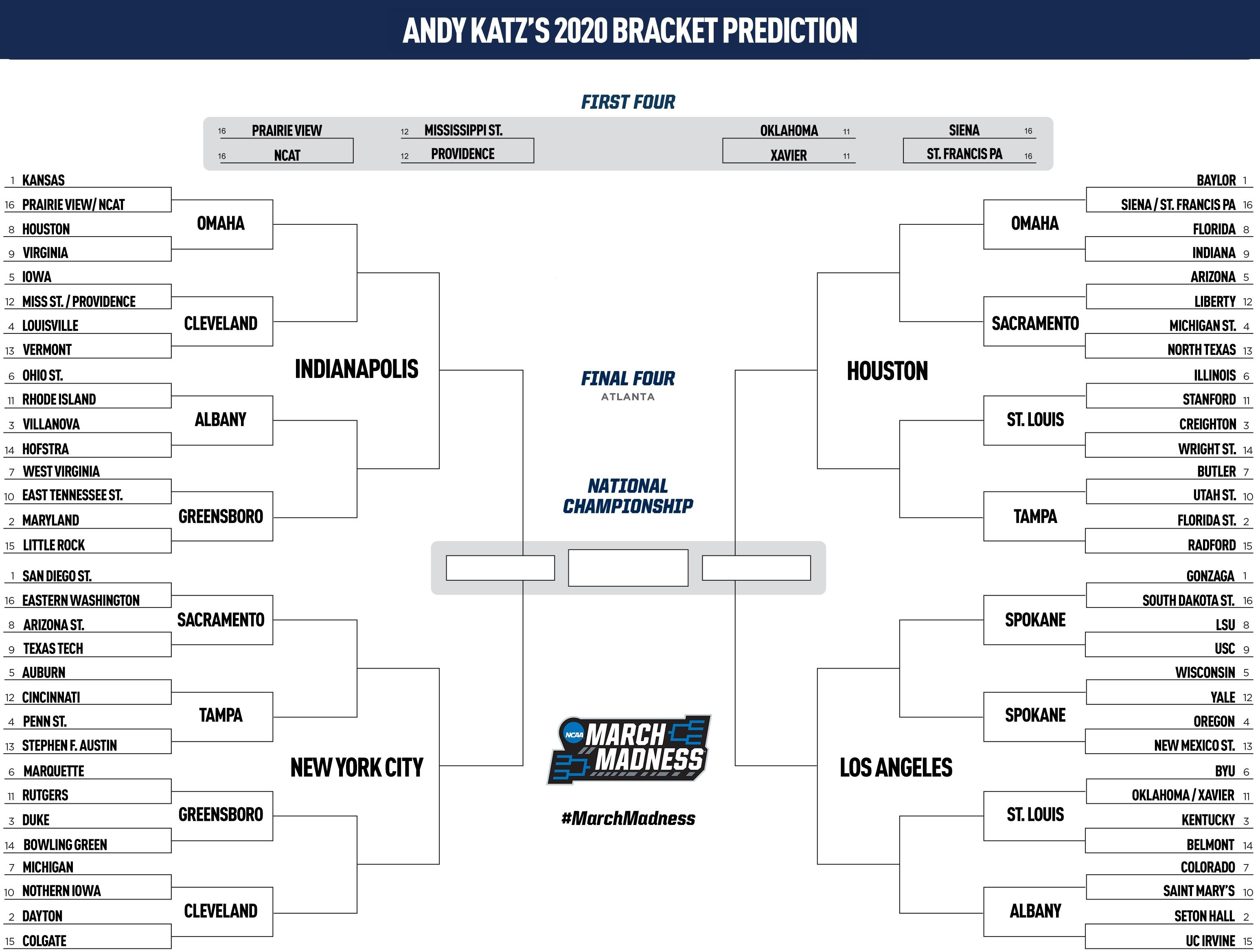When it comes to NCAA bracket predictions, fans across the nation eagerly speculate about their chances of crafting a perfect NCAA bracket during March Madness. The allure of successfully forecasting every game in the tournament captures the imagination of sports enthusiasts, despite the daunting statistics that suggest achieving this feat is virtually impossible. With the odds estimated at 1 in 2^63, comparable to winning the Powerball twice in a row, many have given up hope on finding that elusive perfect NCAA bracket. However, understanding March Madness statistics can help when making bracket odds calculations, especially when analyzing potential upsets. As the tournament progresses, many enthusiasts focus on upset predictions, hoping that a few well-placed surprises could set their brackets apart in the competitive landscape of office pools and friendly wagers.
Exploring the realm of college basketball tournament forecasts opens a dialogue about predicting outcomes during March Madness. Many sports fans engage in the challenge of navigating through the complex web of matchups, aiming to create an impeccable tournament forecast known as the perfect bracket. While the statistics surrounding this undertaking may seem discouraging, understanding bracket probabilities and historical performance can enhance prediction accuracy. Moreover, fans often recognize the significance of identifying potential upsets—those unpredictable twists that can redefine the trajectory of a bracket. As excitement builds with each game, the pursuit of the ideal bracket remains a thrilling adventure, fueled by data-driven insights and the sheer unpredictability of the tournament.
The Odds of a Perfect NCAA Bracket
Predicting a perfect NCAA bracket is an endeavor filled with immense challenges, largely due to the astronomical odds involved. As mentioned by statistician Kevin Rader, the chances of accurately selecting the outcome of all 64 games in a tournament are approximately 1 in 2^63. This staggering figure translates to quintillions, making the approach to a flawless bracket almost akin to winning the Powerball jackpot repeatedly. No one has ever officially completed a perfect bracket, underscoring how unlikely it is to see this feat accomplished in real-time, especially during the notoriously unpredictable March Madness.
Moreover, even experts acknowledge that the intricacies of March Madness statistics play a crucial role in bracket predictions. Top-ranked teams tend to dominate early matches without significant upsets, which skews the typical expectations of a balanced competition. Despite this, the allure of achieving a perfect bracket keeps fans engrossed in the madness of March. With many viewers seeking viable bracket odds, understanding the unpredictability and statistical analyses can improve one’s chances, although falling short in these predictions remains the norm.
Strategies for Successful Bracket Predictions
When entering an office or online pool for NCAA bracket predictions, simply choosing favorites may not suffice if you want to win. A successful strategy often involves identifying potential upsets, as understated teams can outperform expectations. By leveraging statistical research and recent team performances, participants can make informed choices. This intricate balance of selecting both favorites and well-justified upsets can position you better among other competitors, especially in larger pools where differentiation is key to securing a win.
It’s vital to employ tactics surrounding upset predictions effectively. Engaging with March Madness statistics allows bracket contenders to spot trends that may suggest which teams are poised for shock victories. Upsets during tournaments tend to be unpredictable; however, subtle indicators like injuries, team fatigue, and historical matchups can provide insight. Making educated decisions based on these factors will undoubtedly enhance your overall bracket strategy in this competitive landscape.
Understanding the Lottery Comparison in Bracket Odds
The comparisons often drawn between winning a lottery and achieving a perfect NCAA bracket are not unwarranted, as both require a combination of luck and strategy. The lottery odds present an intriguing juxtaposition, with both scenarios reflecting the rarity of achieving a win. The extreme statistical improbability of predicting a flawless bracket mirrors the odds of hitting the jackpot multiple times—which is why avid sports fans and casual viewers alike are captivated by the challenge. Statistically, the only way to boost your chances at both remains through smart selections and perhaps a touch of sheer good fortune.
Within this context, understanding bracket odds tied to lottery comparisons highlights how essential statistical literacy is for potential winners. Analyzing the probabilities associated with different seed performances and historical trends can help fans create better-informed brackets. While winning in either context is a long shot, embracing comprehensive analysis improves your grip on how to navigate these odds, whether filling out your bracket or selecting your lottery numbers.
The Role of Upset Predictions in NCAA Success
Upset predictions can be the defining factor in NCAA bracket success, particularly when the field of competitors is vast. Historically, lower-seeded teams have pulled off surprising victories that can dismantle many brackets. Identifying these potential upsets ahead of time can significantly shift the landscape, allowing foresighted participants to capitalize on these unexpected turns. Previous tournaments have showcased such miracles, reinforcing the notion that anything can happen during this unpredictable March Madness.
To refine your upset predictions, thorough analysis of matchups, team dynamics, and even player health becomes invaluable. Engaging with advanced metrics and historical performance data will guide your choices and help ascertain which matchups hold real potential for surprises. While it may sometimes feel like a gamble, effectively predicting upsets could be your ticket to outperforming competitors in a crowded pool.
Leveraging March Madness Statistics for Bracket Success
March Madness statistics serve as a foundation for crafting a competitive bracket. By analyzing previous tournament performances, participants can identify patterns and trends that might inform their predictions. For example, examining seed success rates or historical upsets can equip folks with valuable insights that might secure victory in their office pools. The more data one can gather, the better equipped they will be to make informed decisions, transforming the guessing game into a calculated strategy.
In addition to evaluating team statistics, understanding the dynamics of player performance and game settings can further enhance bracket strategies. Factors like recent game momentum, home-court advantages, and coach experiences should not be overlooked. Using this information provides a comprehensive picture that can tip the scales of success, enabling fans to craft a compelling argument for their bracket choices and providing them a shot at a winning entry.
Navigating Bracket Odds in Competitive Pools
Engaging in a competitive NCAA bracket pool can be a thrilling yet daunting experience. The challenge lies not just in filling out your bracket correctly, but in aligning your choices with strategies that work against potentially overwhelming odds. Understanding the dynamics of participants in your pool is crucial; if many entries follow predictable trends, differentiating your selections is vital for success. This means combining solid predictions with a few strategic upsets to enhance your chances of outpacing competitors.
To navigate bracket odds effectively, you may want to utilize statistical insights and trends. Tracking how favorites have performed historically against certain opponents or in specific venues adds an additional layer to your analysis. Being aware of this information allows participants to craft informed strategies, amplifying their chances of advancing past the initial rounds and potentially securing a win in bigger pool formats.
The Importance of Different Seed Performance in Bracket Predictions
Different seed performance plays a pivotal role in bracket predictions, with each tournament having its own eccentricities. Typically, higher seeds are favored to triumph; yet, the nature of March Madness often allows for lower seeds to create memorable upsets. Having an acute awareness of how different seeds perform against one another throughout the tournament history can provide an edge. Hence, understanding which seeds consistently underperform can be invaluable as you devise your strategy.
An educated approach to analyzing seeds can lead to more strategic predictions. For example, consistently evaluating how mid-tier teams perform against top seeds can illuminate potential matchups that may favor an underdog. With respect to your overall bracket, coupling favorite selections with carefully considered lower seed predictions can create a balance that increases your probability of success.
Utilizing Statistical Analysis for Bracket Predictions
Utilizing statistical analysis can greatly enhance your ability to predict the outcomes of NCAA matches during March Madness. By dissecting data such as team efficiency ratings and player stats, participants can develop a clearer understanding of each team’s likelihood of winning. Engaging in such fundamentals allows fans to move beyond gut feelings to create scientifically-backed predictions, turning random choices into well-informed selections that stand the test of unpredictability.
Moreover, tracking recent performance statistics will provide further context for predictive analysis. Teams riding momentum or facing adversity can greatly affect outcomes throughout the tournament. Invoking this kind of analytical approach will create a roadmap for your bracket that is significantly more reliable, steering participants away from arbitrary selections and yielding choices grounded in data.
Preparing for March Madness: The Key to Bracket Success
Preparing well ahead of March Madness is crucial to achieving bracket success. It requires diligent research, data analysis, and an understanding of teams that may surprise viewers. Over the years, preparation has demonstrated to be key; knowing prior tournament trends and analyzing team dynamics fosters improved predictions. Fans must remain flexible in their strategies while also being willing to commit to upset predictions for maximum effectiveness.
Strategizing with a clear plan involves recognizing the inherent unpredictability of March Madness. Amid the excitement, sticking to a blend of favorites and well-considered upsets becomes essential. Whether you prefer thorough statistical analysis or rely on intuition, being proficient in preparation can pave the way to engage more effectively, minimizing the risks involved and ensuring an exhilarating tournament experience.
Frequently Asked Questions
What are the odds of creating a perfect NCAA bracket?
The odds of selecting a perfect NCAA bracket are astronomically low, estimated to be 1 in 2^63. This makes achieving a perfect bracket an unlikely feat in anyone’s lifetime since it requires correctly predicting the outcomes of all 64 games, similar to winning the Powerball twice in a row.
How do March Madness statistics inform NCAA bracket predictions?
Utilizing March Madness statistics is crucial for making informed NCAA bracket predictions. By analyzing team performance, historical data, and statistical trends, you can better assess the likelihood of upsets and the odds of advancing teams, enhancing your chances in any bracket challenge.
What strategies can improve my chances of successful NCAA bracket predictions?
To enhance your NCAA bracket predictions, focus on both picking favored teams and identifying potential upsets. Analyze team matchups and March Madness statistics, and consider trends that might indicate underdog performances. Diversifying your choices can set your bracket apart in competitive pools.
How can I make better upset predictions for the NCAA tournament?
Improving upset predictions in your NCAA bracket involves careful analysis of team matchups, historical performances, and current statistics. Look for patterns or disparities that suggest a lower-seeded team has a stronger chance to win, and do not rely solely on intuition when selecting upsets.
Why don’t perfect NCAA brackets exist?
No one has ever recorded a perfect NCAA bracket, primarily due to the unpredictable nature of the tournament and the prevalence of upsets. The complex dynamics of March Madness make it exceptionally challenging to accurately predict outcomes for all games.
What should I consider when comparing bracket odds for NCAA tournament predictions?
When comparing bracket odds for NCAA tournament predictions, consider factors such as team seeding, matchup history, injury reports, and overall team statistics. This comprehensive analysis can provide insights into potential outcomes and improve your predictions.
Is there a ‘lottery comparison’ for NCAA bracket predictions?
Yes, the ‘lottery comparison’ for NCAA bracket predictions is often referenced to illustrate the improbability of achieving a perfect bracket. The odds of success in both scenarios are shockingly low, emphasizing the challenge of accurately selecting every game outcome.
What common mistakes should I avoid in my NCAA bracket predictions?
Common mistakes in NCAA bracket predictions include overvaluing top seeds, underestimating lower-seeded teams, and neglecting to account for March Madness statistics. Avoid bias from team loyalty and ensure to research before finalizing your selections.
How important is seeding in NCAA bracket predictions?
Seeding is a critical factor in NCAA bracket predictions, as higher-seeded teams have historically performed better in the tournament. However, it is important to balance this with insights gained from March Madness statistics and potential upset predictions.
What resources are best for making NCAA bracket predictions?
Top resources for making NCAA bracket predictions include statistical databases, expert analysis on sports websites, and historical performance records. Utilizing these resources can provide you with a strategic edge in your bracket selections.
| Key Points | Details |
|---|---|
| Odds of a Perfect Bracket | The probability is 1 in 2^63, which is extremely low, estimated to be in the quintillions. |
| Feasibility | No one has recorded achieving a perfect bracket; current data shows no perfect brackets so far this year. |
| Top Seeds Performance | Top-seeded teams almost never lose in the first round, complicating perfect bracket chances. |
| Predicting Upsets | Accurate upset predictions require careful consideration of the teams; a mix of favorites and underdogs is essential. |
| Winning Office Pools | Standing out in an office pool requires more than just picking favorites; you need strategic upset selections. |
Summary
NCAA bracket predictions consistently show that achieving a perfect bracket is nearly impossible for anyone. Given the immense odds stacked against you, predicting outcomes accurately requires understanding team dynamics, recognizing the potential for upsets, and strategically balancing your selections. While the focus may primarily be on favorites, incorporating a calculated risk with a few underdogs can significantly enhance your chances, especially in competitive settings like office pools.



